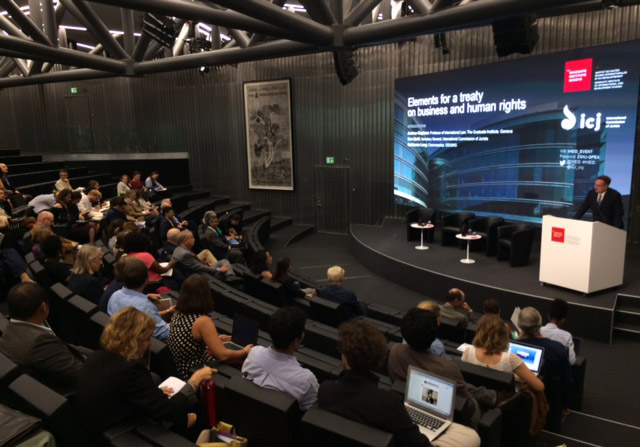
Sep 5, 2017 | Eventos, Noticias
Hoy la CIJ y el Institut de Hautes Etudes Internationales et du Développement co-organizaron una conferencia pública sobre los Elementos de un tratado sobre las empresas y los derechos humanos.
En junio de 2014, el Consejo de Derechos Humanos de las Naciones Unidas estableció un grupo de trabajo intergubernamental encargado de “elaborar un instrumento internacional jurídicamente vinculante para regular, en el derecho internacional de los derechos humanos, las actividades de las empresas transnacionales y otras empresas comerciales”.
La tercera reunión del Grupo de trabajo tendrá lugar del 23 al 27 de octubre de 2017 en el Palacio de las Naciones.
El evento tuvo lugar en un momento crítico para informar el proceso de elaboración del tratado en el Grupo de trabajo, y se orientó a fomentar el intercambio de opiniones entre los actores internacionales con el objetivo de crear las base para el consenso sobre los posibles contenidos de un instrumento jurídicamente vinculante en el ámbito de las empresas y los derechos humanos.
Se espera que el futuro tratado contribuya a subsanar algunas deficiencias en el marco normativo internacional en materia de rendición de cuentas, en relación con las operaciones de las empresas en materia de derechos humanos. El tratado también debería fortalecer la acción de los Estados para garantizar recursos efectivos y reparaciones para las víctimas de abusos.
Este tratado será el primero en el marco internacional del derecho de los derechos humanos para abordar directamente las actividades de las sociedades comerciales.
El tema de los impactos de los derechos humanos por parte de las empresas comerciales figura a la cabeza de la agenda internacional sobre el que se han desarrollado varios instrumentos no vinculantes, entre los que destacan los Principios Rectores sobre las Empresas y los Derechos Humanos.
Se prevé que el proceso hacia un tratado en este ámbito se basará en los logros alcanzados hasta la fecha, cubriendo las lagunas restantes y mejorando las normas y la acción de los Estados y las empresas por igual.
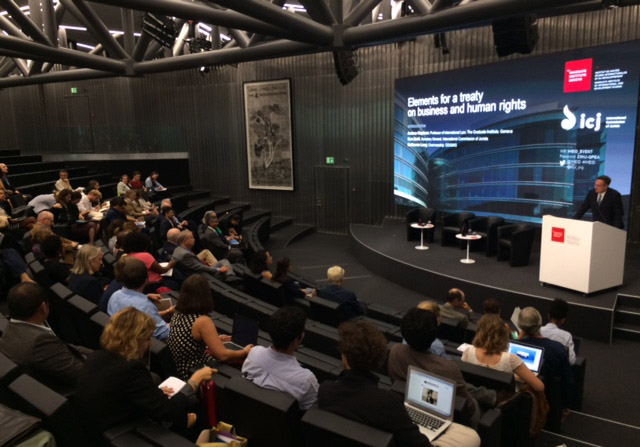
Sep 5, 2017 | Events, News
Today the ICJ and the Graduate Institute of International and Development Studies co-organized a public conference: Elements of a treaty on Business and Human Rights.
In June 2014, the United Nations Human Rights Council established an inter-governmental working group to “elaborate an international legally binding instrument to regulate, in international human rights law, the activities of transnational corporations and other business enterprises”.
The third session of the working group will take place from 23-27 October 2017 at the Palais des Nations.
Today’s event took place at a critical moment to inform the process of elaboration by the working group.
It fosters the exchange of views among international actors, with the aim of creating the basis for consensus on possible contents of a legally binding instrument in the field of business and human rights.
The prospective treaty is expected to contribute to fill some accountability gaps in the international normative framework, in relation to the operations of business enterprises in terms of human rights.
The treaty should also enhance States’ action to ensure effective remedies and reparations for the victims of abuses.
This treaty will be the first in the international human rights law framework to address directly activities of business corporations.
The issue of human rights impacts by business enterprises has reached the top of the international agenda, and several non-treaty instruments have been developed, foremost among them the Guiding Principles on Business and Human Rights.
The process towards a treaty in this field is expected to build on the achievements so far, filling remaining gaps and enhancing rules for and action by states and businesses alike.
For additional information & registration click here
See also the photo of the week on Genève Internationale
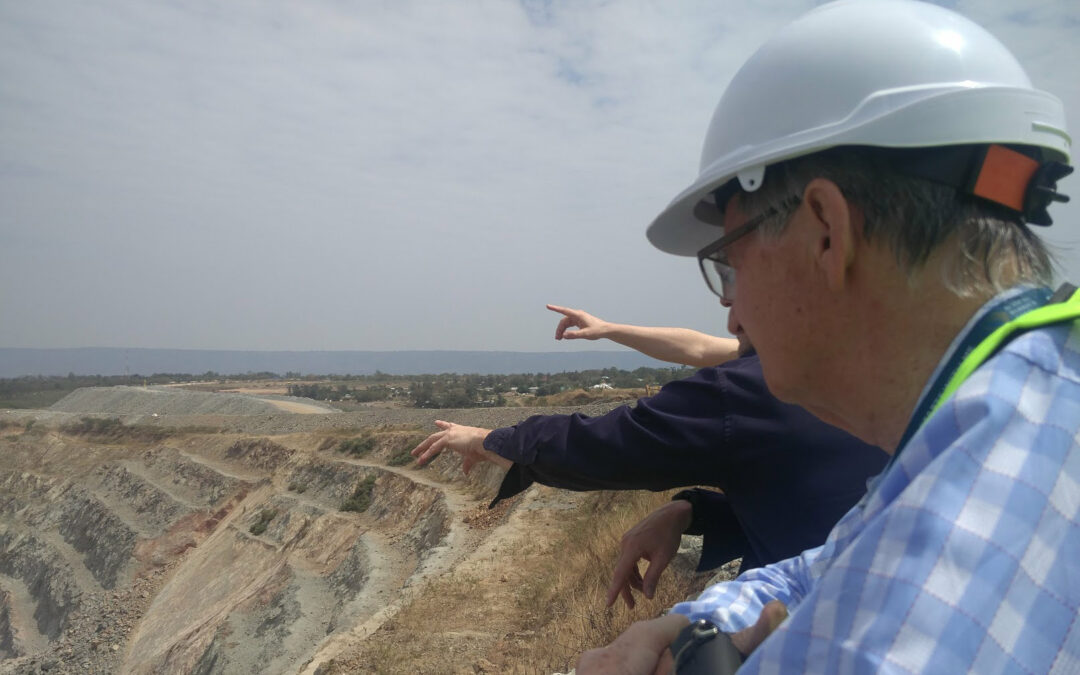
Sep 1, 2017 | Feature articles, News
Today, an ICJ delegation concluded a learning and assessment mission to the North Mara region and the North Mara Gold Mine Ltd, a subsidiary of Acacia Mining plc located in north-west Tanzania in the Tarime district of the Mara region.
The visit took place between 27 August and 1 September.
The objective of the ICJ Mission was to learn about the operation with a view to assessing the effectiveness of the North Mara Gold Mine’s operational grievance mechanism (OGM) in addressing complaints over alleged human rights concerns and abuses committed in connection with the mine’s operations.
The members of the ICJ delegation were: ICJ Commissioners Justice Ian Binnie and Alejandro Salinas, accompanied by Mr Carlos Lopez, ICJ Senior Legal Adviser, and Mrs Antonella Angelini, researcher.
Read the full story here: Tanzania-BHR mission North Mara-News-Features article-2017-ENG (in PDF)
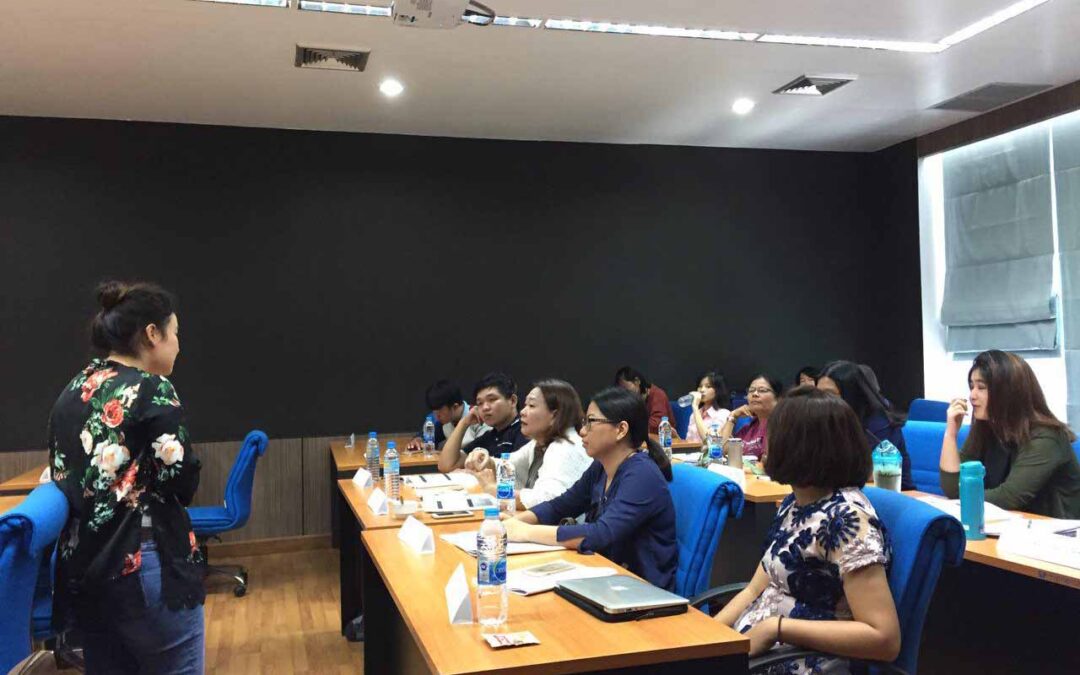
Jul 31, 2017 | News
On 29-31 July 2017, the ICJ, in collaboration with Chiang Mai University’s Faculty of Law, held a workshop on “Introduction to Business and Human Rights & Basic Principles on Documenting Human Rights Violations” for 25 academics, NGO representatives and lawyers in Chiang Mai.
The objective of the workshop, held at the Chiang Mai University campus, was to provide an overview of the field of business and human rights, including the UN Guiding Principles on Business and Human Rights and its “Protect, Respect and Remedy” framework, which Thailand affirmed its commitment to on 31 May 2017, and the need for a binding treaty on business and human rights.
Day 1 focused on the UN framework as it applies to business and human rights, investment law, and strategic litigation.
Day 2 focused on criminal and civil litigation, women’s rights and business, children’s rights and business, and land rights.
Day 3 focused on the basic principles that apply to documenting and reporting on human rights violations.
The speakers at the workshop were:
- Daniel Aguirre, ICJ International Legal Adviser, Myanmar
- Irene Pietropaoli, Expert consultant on business and human rights
- Sanhawan Srisod, ICJ Associate National Legal Adviser, Thailand
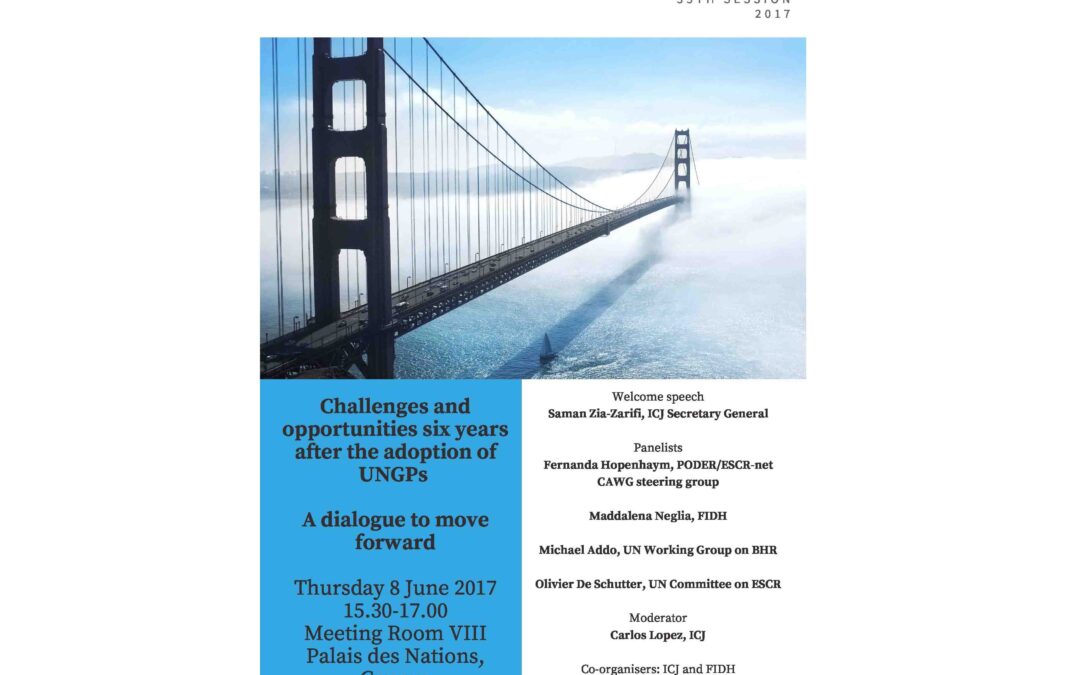
Jun 8, 2017 | Events, News
Today, the ICJ and FIDH are organizing a side event to to the 35th Regular session of the Human Rights Council on business and human rights.
Business responsibility to respect human rights
Challenges and opportunities six years after the adoption of UNGPs
A dialogue to move forward
Thursday 8 June 2017, 15.30-17.00
Meeting Room VIII
Palais des Nations, Geneva
After the adoption of the UNGP in 2011, standards on business responsibility to respect human rights and business human rights due diligence have gained prominence in the global debate on business accountability.
Many companies claim to comply with the UNGP by performing a human rights due diligence including across their global supply chain.
Several initiatives have emerged at regional and national level to promote companies’ due diligence processes, including the EU Directive on non-financial reporting, the UK Modern Slavery Act, the French law on company devoir de vigilance.
Despite the progress, serious human rights abuses still occur in both developing and developed countries.
The ability of companies to identify, monitor and prevent negative human rights impacts in their operations and relationships is still weak and the access to effective remedy remains difficult if not impossible.
This is an opportune moment to take stock of the progresses made to date and the challenges ahead in order to create a level playing field that will effectively promote the respect of human rights in business global operations.
Welcome speech
Saman Zia-Zarifi, ICJ Secretary General
Moderator
Carlos Lopez, ICJ
Panelists
Fernanda Hopenhaym, PODER/ESCR-net CAWG steering group
Maddalena Neglia, FIDH
Michael Addo, UN Working Group on BHR
Olivier De Schutter, UN Committee on ESCR/University of Louvain









